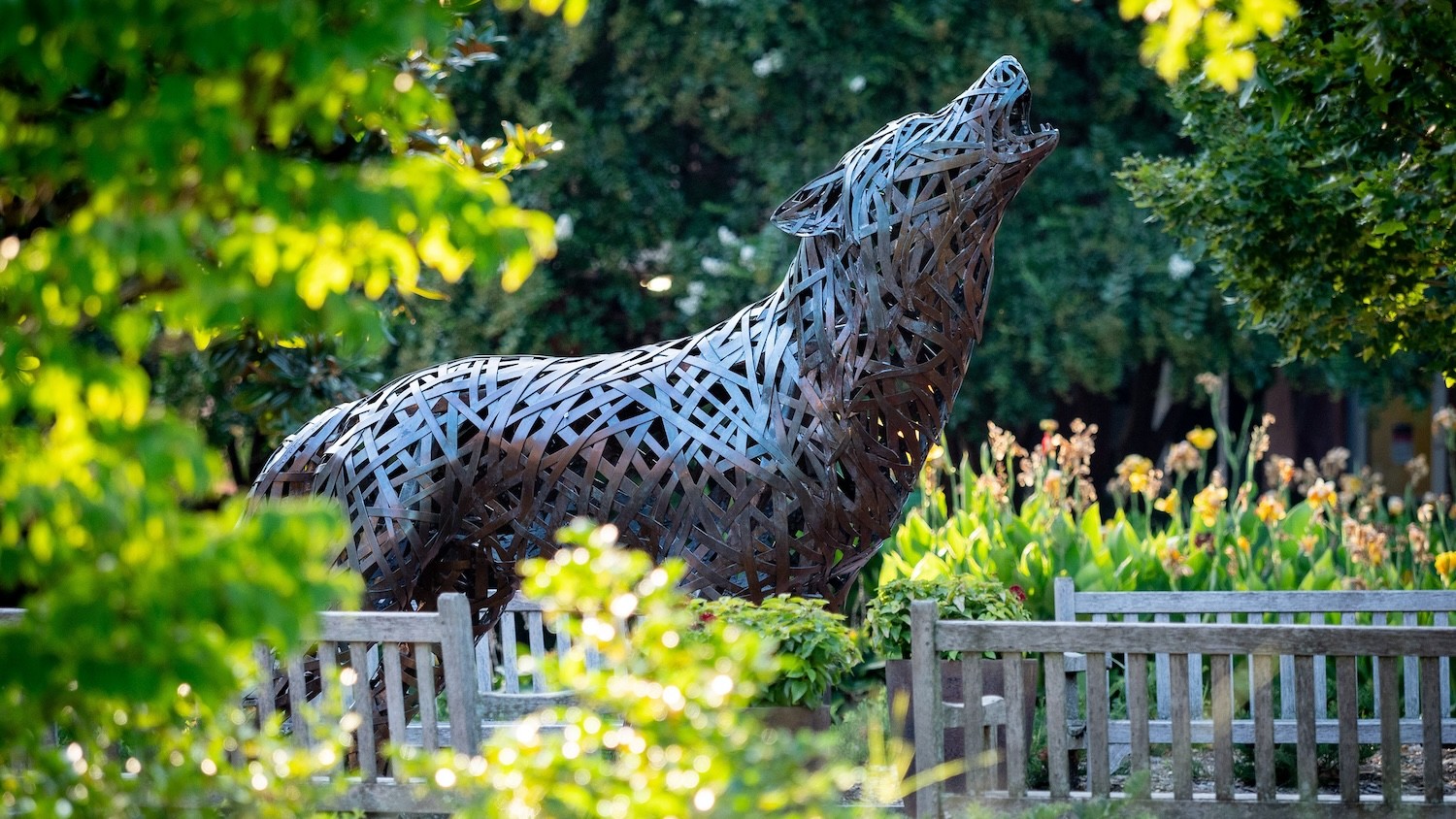
New Training Program Tackles AI and Plant Science Challenges
GRAD-AID for Ag will give graduate students the chance to drive innovation in artificial intelligence technologies at the intersection of basic and applied plant sciences.
September 11, 2024 ![]() Dee Shore
Dee Shore
Pairing artificial intelligence with plant sciences in the lab and in the field, NC State University is building a program to help create a new generation of leaders to advance agriculture.
The National Science Foundation (NSF) awarded the university $3 million over five years to establish and carry out a national graduate student research traineeship in artificial intelligence for sustainable agriculture. Titled the National Research Traineeship-AI: Graduate Training in Translational Convergent Research — Harnessing AI and Data Science for Sustainable Agriculture, the program is called GRAD-AID for Ag, for short.
Fayetteville State University (FSU) is a key project partner.
Goals include driving innovation in AI technologies at the intersection of basic and applied plant science, while helping to ensure a skilled, diverse workforce capable of solving local and global challenges in agricultural sustainability and food security.
While advances in both fundamental and applied research have driven innovation in agriculture, these advancements are falling short of meeting the escalating demand for solutions. … Artificial intelligence can help us overcome these challenges.
The program plans to welcome its first graduate student participants in the summer of 2025. A total of 21 students in two cohorts — one that starts in 2025, and the next in 2027 — will be admitted to the program and receive funding for tuition, fees and a stipend for two years.
Funding comes not only from the NSF grant but from NC State’s College of Agriculture and Life Sciences (CALS), College of Engineering (COE) and Office of the Executive Vice Chancellor and Provost.
A Diverse Project Team
The project’s principal investigator is Terri Long, a professor with NC State’s Department of Plant and Microbial Biology (PMB) and the N.C. Plant Sciences Initiative (N.C. PSI)’s platform director for education and workforce development.
Co-principal investigators are NC State’s Anna Stepanova, also of PMB; Cranos Williams, of the departments of Electrical and Computer Engineering and PMB; and Huiling Ding, of the Department of English and the Data Sciences Academy, as well as Lieceng Zhu of Fayetteville State University’s Department of Biological and Forensic Sciences.
In all, 29 professors from FSU and NC State are participating. Those from NC State come from the Data Science Academy, CALS, COE and the College of Natural Resources.
Addressing Complex Agricultural Challenges
Long says the program will be an important step in training students to tackle agricultural challenges that require an interdisciplinary approach, blending basic and applied sciences along with knowledge of artificial intelligence.
“Agriculture’s success depends on our ability to produce plants that tolerate increasing heat, drought and extreme weather events while requiring fewer resources, such as land and fertilizer, for growth,” explains Long. “These things are affecting people’s lives not just in the future but right now, and artificial intelligence can help us overcome these challenges.”
Williams, the N.C. PSI’s data analytics platform director, agreed.
“Through this traineeship, student cohorts will have the opportunity to use artificial intelligence and machine learning to bridge translational gaps between basic and applied plant sciences research,” he says. “This will increase accessibility of data science tools and training for plant scientists and accelerate the innovation needed to address grand challenges in agriculture.”
Students … with AI expertise will be able to better understand the challenges present in agriculture, … and students from the plant science side will be exposed to state-of-the-art AI tools.
Edgar Lobaton, a professor in the Department of Electrical and Computer Engineering, says the program will provide students with “a more holistic exposure to the application of artificial intelligence to agriculture in general.”
“Students coming to the program with AI expertise will be able to better understand the challenges present in agriculture and identify the need for new tools in the domain, and students from the plant science side will be exposed to state-of-the-art AI tools,” he adds.
From Field and Classroom to Research and Solutions
Participants will begin GRAD-AID for Ag by spending a week in Eastern North Carolina with farmers, Extension agents and agribusiness professionals, learning more about the agricultural challenges they encounter. They’ll also take courses in statistics, AI literacy and AI’s ethical and social implications, and they’ll participate in guest lectures and workshops held at FSU.
The centerpiece of the program will be a capstone project in which students work in teams to pursue solutions to complex agricultural challenges with trainers from both NC State and FSU.
Each team will include three students: one in AI or other data sciences, another in basic plant sciences such as molecular biology or genetics, and a third in applied sciences that connect them with field research in agriculture.
Connecting Across Disciplines
Long says that having science graduates who can communicate effectively across disciplines is key to overcoming barriers that slow scientific progress in addressing agricultural problems.
As she and her collaborators state in their proposal for NSF funding, “While advances in both fundamental and applied research have driven innovation in agriculture, these advancements are falling short of meeting the escalating demand for solutions.”
The collaborators attribute the shortfall to a disconnect between scientists who work mainly in laboratories and those who mainly translate research into solutions that work for growers.
For example, fundamental plant science discoveries made in incubators and greenhouses don’t always hold up in the field when plants face the challenges of harsh conditions, the team writes. “A potential solution to this problem has emerged in the form of artificial intelligence, machine learning and other data-driven approaches.”
As Long says, “If you had more engagement between field specialists and lab specialists, then we could make that transition smoother and less time consuming. And artificial intelligence, I believe, can really help with that transition.”
Already, these approaches are already making headway in solving problems that plague farmers, Long says, but more collaborative research is needed.
Stepanova, a plant biologist and geneticist who regularly works with engineers, says that as AI becomes an increasingly important part of our everyday personal and professional lives, “it is imperative that students learn to properly leverage new AI tools and capabilities in their classes and research.
“Plant biology is no exception: From plant species identification and disease classification to finding patterns in complex experimental datasets and predicting outcomes of field trials, we can all benefit from fast-evolving AI tools improving student educational experiences or accelerating one’s research progress.”
The FSU Connection
To encourage recruitment of students from a variety of backgrounds into the agricultural sciences and the GRAD-AID for Ag program, the project is building on an existing relationship between NC State and FSU.
Participants will have opportunities to participate in seminars and workshops at FSU, providing FSU students the opportunity to gain more insight into career opportunities in agricultural science.
Zhu, a professor in FSU’s Department of Biological and Forensic Sciences, says the project will be a win-win for both institutions.
“What excites me most about this project is the opportunity for FSU … to provide a platform for NC State graduate students to gain a deeper understanding of diversity and the unique challenges and prospects minority-serving institutions and their students are facing,” she says.
“In return,” Zhu adds, “NC State graduate students will bring their research findings and unique learning experiences … and their advanced knowledge in integrating AI with biology and agriculture-related research, which will inspire FSU students to learn and grow.”
Learn More
For more information about the program or to apply, please contact Terri Long at talong@ncsu.edu.
Original article from CALS News
Cranos Williams
Goodnight Distinguished Professor of Agricultural AnalyticsPlatform Director, NC Plant Sciences Initiative


